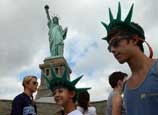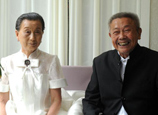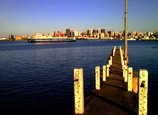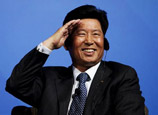
CAIRO, June 30 (Xinhua) -- After a year in office, Egyptian first democratically elected President Mohamed Morsi is facing challenges that threaten completion of his four-year term accumulated amid overwhelming rival protests of his opponents and supporters.
The following are some major events during Morsi's one-year rule.
On June 24, 2012, Egypt's presidential election commission announced the victory of the Muslim Brotherhood's (MB) candidate in a historic democratic polls after the fall of the former president Hosni Mubarak.
Morsi, ex-chairman of the Freedom and Justice Party (FJP), the political wing of the MB, garnered just over 51 percent of the votes in the run-off round, defeating his rival Ahmed Shafiq, the last prime minister of Mubarak.
Six days later, on June 30, Morsi was sworn in as president before the Supreme Constitutional Court (SCC).
After nine days in office, Morsi issued a decree to reinstate the previously dismantled People's Assembly (the lower house of parliament), but a day later, the SCC suspended the decree and the president upheld the court decision.
On Aug. 2, Morsi appointed Islamist-inclined Hesham Qandil as prime minister and ordered him to form a new government.
A couple of days later, particularly on Aug. 5, 16 Egyptian soldiers were shot dead in a checkpoint in North Sinai by unknown militants. Observers blamed members of Hamas movement for the bloody accident which raised concerns over Egypt's new Islamist administration.
Since Aug. 8, Morsi sacked a series of Mubarak-era senior officials, topped by the intelligence chief, the governor of North Sinai and a number of interior ministry officials.
On Aug. 12, Morsi issued a decree to force the retirement of ex- defense minister and head of the armed forces Hussein Tantawi as well as former army chief of staff Sami Annan. In the same decree, Morsi amended a constitutional declaration, by which he acquired full executive and legislative power.
On Oct. 11, Morsi decided to appoint Prosecutor-General Abdel- Maguid Mahmoud as Egypt's ambassador to Vatican, in a bid to remove him from his post, but he gave up his decision two days later after Mahmoud and some other judges challenged the decision, as according to the Egyptian law, the president has no power to dismiss the chief prosecutor.
On Nov. 22, Morsi issued his most controversial constitutional declaration, immunizing his decisions against judicial supervision and safeguarding the Islamist-dominated constitution-writing panel and the Shura Council (upper house of parliament) against being dismantled.
Under the same constitutional declaration, Morsi appointed Talaat Ibrahim Abdullah as a new prosecutor-general, as the new declaration gave him the power to do so.
Consequently, throngs of people flocked to the main Egyptian squares and outside the presidential palaces for the first time since Morsi assumed power, demanding him to revoke the disputed constitutional declaration. Clashes between Morsi's opponents and supporters then left at least five killed and over 1,000 injured.
As for his foreign policies, Morsi's strategy aimed at achieving balanced diplomatic ties and reinforcing relations with some international forces that were once neglected by his ousted predecessor.
On Aug. 28, the president visited China as his first destination outside Africa and the Middle East following his diplomatic trips to Saudi Arabia and Ethiopia.
Two days later, he paid a visit to Iran to participate in the Non-Aligned Movement summit, and reciprocally, then Iranian president Mahmoud Ahmadinejad visited Egypt to attend an Islamic summit, marking gradual restoration of ties between the two countries after three decades of rift.
On Dec. 2, Morsi called the nation for a referendum on the constitution drafted by a controversial constituent assembly.
Morsi formally passed legislative authority to the Shura Council on Dec. 29, as stipulated in the newly-approved constitution.
Since the beginning of 2013, Morsi started calling for national dialogues to reach reconciliation with the opposition and liberal forces over disputed issues.
Another controversial and worrying issue has been emerged when Ethiopia started diverting the course of the Nile in preparation for building its aspired Renaissance Dam, raising concerns over Egypt's share of the Nile water, a vital source for life in the turmoil-stricken country.
On June 15, Morsi announced cutting ties with Syria, shutting down the Syrian embassy in Cairo and withdrawing the Egyptian charge d'affaires from Damascus.
On June 17, the president appointed eight Islamist governors in a reshuffle including 17 governors, inciting protests across the country.
Over the past few weeks, activists launched an anti-Morsi rebel campaign and gathered millions of petitions to oust Morsi and call for an early presidential election, which has been countered by a pro-Morsi campaign held by his Islamist supporters.
On Saturday, the rebel campaign said it gathered over 22 million signatures while the pro-Morsi campaign said it collected over 26 million signatures of the president's supporters.
June 30, which marks the first anniversary of Morsi's rule, is a long day in Egypt as both the president's opponents and proponents have been mobilizing for the day amid fears of possible violent clashes between the two sides.
Over the past week, clashes between Morsi's opponents and supporters have killed at least eight people and injured some 600 nationwide. (Mahmoud Fouly contributed to this story)


















![]()
